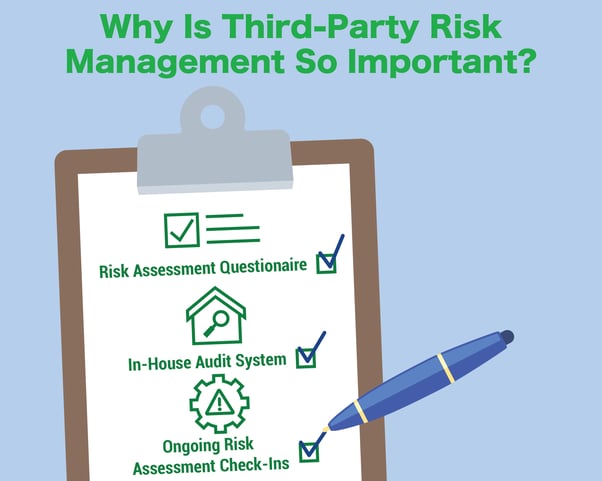4 Things Every CEO Should Know about Managed IT Services
IT operations are an indispensable part of modern business. Companies rely on IT solutions for coordinating employees, managing interactions with...

Running your business is more than just addressing customer needs. You have to make sure you’re in a secure spot to do so.
Businesses are constantly trying to keep risk at bay, from preventing security breaches to marketing consistently. What do you do when your own partners seem to hold the biggest risk? Third-party vendors are a great asset to businesses, providing you with a wide set of valuable skills to help you generate consistent income. Third-party vendors can quickly become another financial and legal hurdle if not appropriately vetted.
Why is third-party risk management so important? Read below to learn about the value of proper vetting and how you can avoid common pitfalls on your way to effective collaboration.

Businesses regularly operate with go-betweens. Everything you do is filtered through another set of eyes and skills in an increasingly globalized world.
Recent statistics have found IT businesses focus on improving risk assessment and management. Third-party vendors fill in the gap left by a company that can’t do everything in-house. While this flexibility helps address new challenges on the fly, it can also throw a monkey wrench into your carefully designed plans.
Today third-party vendors can be used for all kinds of services, ranging from email marketing to sales. Mitigating the risk will open up your business’s ability to stay competitive and save money.
Related: Data Breaches Are Increasing The Need For Cyber Liability Insurance
Not having third-party risk management can debilitate your business in several ways.
Your biggest concerns are losing money, security breaches, and failing to achieve your business goals in a timely fashion.
We’re going to list off some of the issues you can run into when you work with an unreliable third-party vendor.
If you work with a third-party vendor that engages in shady or outright illegal behavior, the damage to your business reputation could be massive.
Customers today are more engaged in business research than ever before. If your primary audience catches wind that their data or morals could be at stake working with you, then you could have a hard time bouncing back financially.
Even a few missed days of work can set your business back significantly.
Working with a risky third-party vendor can impact your employees’ ability to do their job on time or accurately.
Risky behavior can include (but isn’t limited to):
Sometimes you work with a third-party vendor that simply isn’t a good fit. Other times, you can run into a third-party vendor engaging in illegal activity, which automatically puts your business under a microscope.
If you’re found liable for the behaviors of a third-party vendor, you could pay expensive fines. Demonstrating that you put in the work to mitigate risk will go a long way in legally putting you in a positive light.
Related: 15 Technology Challenges Businesses May Face In 2022
Technology is a double-edged sword. We help keep security risks at bay with a mix of cutting-edge tools and modern business strategies.
Third-party risk management empowers your business to avoid legal, financial, and marketing pitfalls.
This process is a vital step-by-step list to target weak points and keep small problems from becoming major hassles.
The most practical approach to third-party risk management is to create a baseline you use for all third-party collaboration. While a case-by-case basis may seem more reliable, it can put too much effort on your end. You’re trying to reduce the work on your plate, after all.
We’re going to break down the foundations of a third-party risk management framework to get you started.
This questionnaire is a simple, yet effective way to vet your third-party vendor.
Useful questions you can ask to gauge their pros and cons include:
It’s best to keep your audit system in-house.
Letting your third-party vendor inspect themselves defeats the purpose of providing additional oversight.
Audits should include a list of requirements needed to work with your business, as well as key performance indicators for privacy and assurance standards.
Simply checking risk once doesn’t do the trick.
Set a schedule to regularly update your third-party risk assessment information on a rolling basis, such as every three to six months.
These risk assessments can include asking about software updates, newly introduced laws, or bringing up concerns about software.
Related: Everything You Need To Know About Spear Fishing
Third-party risk management is best done with a series of clearly defined steps for your third-party vendor. Each step should include a risk assessment questionnaire, an in-house audit system, and ongoing risk assessment check-ins. Any vendor that is unable to meet these standards should be circumvented in favor of another option.
Give your business reliable protection in 2022. Contact us today to learn more about our IT management, software development, and staff augmentation services.

IT operations are an indispensable part of modern business. Companies rely on IT solutions for coordinating employees, managing interactions with...

For businesses to function effectively in the current era of massive market competition, it’s essential that they actively utilize the best, most...

Keeping your business safe isn’t usually a single step. It’s a series of vital steps designed to build a barricade around you and your most vital...